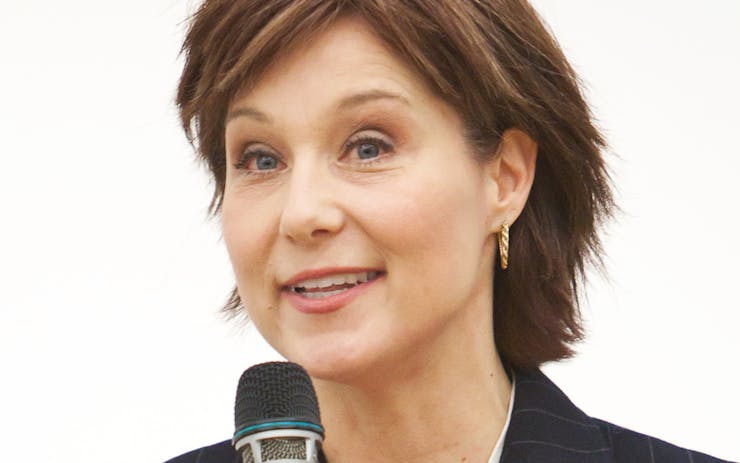The future of BC Bud may be determined this coming Tuesday, May 9, when British Columbians go to the ballot box to elect a premier to lead the province through the process of cannabis legalization.
In a tight race, New Democratic Party leader John Horgan is hoping to unseat Christy Clark (above) of the BC Liberals, who has served as premier since 2011. The trailing third candidate, Dr. Andrew Weaver of the BC Green Party, is hopeful this election will give the Greens enough seats to raise the party to official status.
BC is the nation's cannabis heartland: The province has 13% of Canada's population, but 40% of its dispensaries.
The latest polls show the NDP winning in a very close race—but the polls have been wrong before. In 2013, pollsters miscalculated so poorly that one headline declared NDP leader Adrian Dix “could win if he kicked a dog.” Clark triumphed, and the story remains an embarrassment for the pollsters.
Why is this election so important for cannabis legalization? Because in the proposed regulation scheme tabled last month by Prime Minister Justin Trudeau’s government, the federal government gave the provinces jurisdiction over age limits and distribution rules. Distribution rights and licenses figure to be among the biggest battles that will set the future of the industry.
And make no doubt: BC remains Canada’s cannabis heartland. Of the estimated 500 medical cannabis dispensaries now operating in Canada, about 200 are in BC. That means that a province with 13 percent of Canada’s population has 40 percent of the nation’s dispensaries.
The province’s tolerant cities are partly responsible for the high per-capita dispensary rate. Vancouver and Victoria have issued municipal business licenses to applicants who meet the cities’ regulatory framework.
Where Do the Parties Split on Cannabis?
It’s unclear how the parties differ on policies regarding the coming legalization scheme. Nobody seems to be opposing legalization outright. The BC Liberals haven’t provided a clear message, although Christy Clark has said “…we are going to make sure that we implement it safely in a way that protects children, in a way that protects users who want to know what they’re getting and in a way that makes sure that organized crime doesn’t see any benefit from it.” Clark has criticized Horgan for supporting the idea of distributing cannabis through liquor stores. “He’s taken over $100,000 from the BCGEU”—the British Columbia Government Employee’s Union—”and now he suddenly wants to put marijuana in our liquor stores, despite the fact that no one in North America is doing that,” she said.
Liquor stores are run both privately and by the government in BC. In Ontario, liquor is only distributed through government-owned retail stores. Government employee unions have been lobbying for cannabis distribution in both provinces.
Former British Columbia NDP leader Carole James, who is running for a fourth term representing a district in downtown Victoria, said the “main consideration for marijuana legalization is getting rid of the black market and ensuring it doesn’t get into the hands of young people. Because marijuana is used for both medicinal and recreational purposes its distribution will be different than alcohol. A BC NDP government will consult widely on distribution and consider an array of avenues. The decision will be made by experts. We’ll have effective regulations that meet the law while ensuring communities and kids stay safe.”
Shop highly rated dispensaries near you
Showing you dispensaries nearTo prepare for the changes that legalization will bring, John Horgan recently sent James and Public Safety spokesperson Mike Farnworth to Washington state and Oregon to learn best practices, “so that a BC NDP government would be ready make this transition in a fair, orderly and safe way,” James said.
The Greens Want a Craft Industry
Dr. Andrew Weaver, leader of the BC Greens, strongly supports an inclusive and diverse cannabis market. “ BC Greens will protect BC’s craft cannabis industry, ensure interprovincial trade barriers are not imposed, and support small business in the distrubution of cannabis,” Weaver said.
With its long history of cannabis cultivation and culture, British Columbia is the California of Canada. The province produces an estimated 70% of the cannabis distributed in Canada.
The province’s legacy of cultivation goes back to the late sixties. The Vietnam War was raging and young American men who were opposed to the war and the draft sought refuge in pockets of the often-rough Canadian landscape. Many of them landed in remote settlements with a notably off the grid, anti-establishment mindset, partially to avoid detection but in many cases because it was where they wanted to be. The draft dodgers were opposed to war and held ideals very much in tune with the same ideals cannabis has evoked over decades of illegitimacy. The BC Bud industry was born.
Today the cannabis industry in British Columbia is estimated to range between $2 billion and $7 billion. At the $7 billion level, the industry would represent nearly 3% of provincial GDP and would account for more revenue than British Columbia’s forestry and fisheries sectors combined.
What Matters to Voters: Housing and Jobs
The focus of this election has been primarily on housing, jobs and the province’s ho-hum economy. Politicians have steered clear of any discussion of cannabis. BC Liberals lean to the right of the political spectrum, while the NDP have strong union ties and the Greens are focused on environmental issues. As important as cannabis is to the BC economy, political stigma still clings to the issue. As the media has been saturated with talk of legalization on the federal level in Canada, the usually loud and often assertive BC cannabis community has remained relatively quiet during this provincial campaign, perhaps because of uncertainty about which government they might have to work with.
Sensible BC, a group out of Vancouver that attempted to hold a referendum to end cannabis arrests in British Columbia in 2013, released an overview of party positions to their members and most recently a group of advocates and business owners in Victoria endorsed several Green Party candidates and a Liberal candidate who support their vision for the southern Island.
If the Liberals win a majority, BC can expect a very corporatized and conservative approach to cannabis legalization. If the NDP are elected, the unions will have some influence over the shape of the distribution system. If the Greens are able to secure a few more seats, they’re expected to push for more responsible environmental regulatory policies based on the existing craft beer model.
The final chapters of the BC Bud saga are about to be written, and the results of tomorrow’s election may determine just how happy the ending will be.






